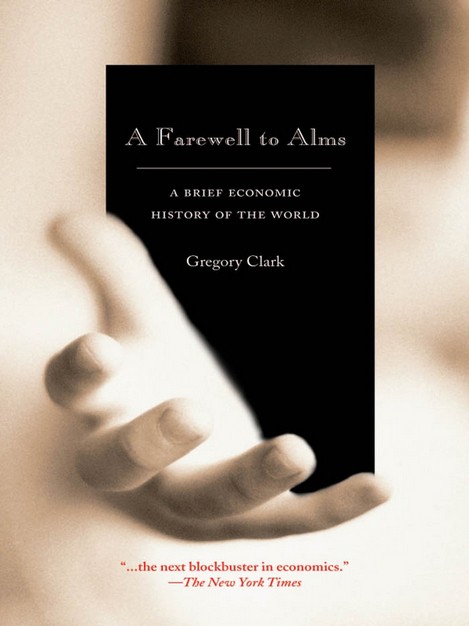A Farewell to Alms: A Brief Economic History of the World
By Gregory ClarkChosen by: USAID Administrator Rajiv Shah
Synopsis:
The source of human progress has long been a subject of debate. What makes rich countries rich, and poor countries poor? In the 2006 “A Farewell to Alms: A Brief Economic History of the World,” University of California, Davis, Economist Gregory Clark offers a provocative take on the age-old question, arguing that it was culture—rather than geography, natural resources or centuries of exploitation—that left some parts of the globe behind.
According to Clark, relative stability and effective workforces enabled certain societies to take better advantage of the Industrial Revolution’s new technologies and opportunities. Those countries with lax systems or undisciplined workers lost ground, and stayed there.
Clark’s book is skeptical of whether the poorest parts of the world will ever achieve real progress. For development professionals, it offers up a challenge to the belief that outside intervention can help bridge the vast economic divide between rich and poor.

Administrator Shah: This book impacted me because it shows how for hundreds, or even thousands, of years basic economic progress was largely stagnant. You didn’t have rapid compound increases in living standards until the Industrial Revolution when some countries and some societies got on a pathway towards growth – towards better health, longer life expectancy, higher income per person and more investment in education. Others remained on a slower-moving pathway.
That great divergence, and the study of it, is at the core of development. It is that divergence that we try to learn from and correct for. We define success in development as helping communities and countries get on that pathway towards improved health and education, and greater wealth creation.
I didn’t choose this book because I think it is the definitive story on development, but rather because I share its focus on core economic growth as the driver of divergence.
I disagree where Clark concludes that some societies failed to take advantage of the availability of modern technology because their cultures were antagonistic to development. With the right conditions in place, you can unlock a formidable work ethic from a range of different cultures and communities. The last 50 years have shown us that. By investing in local capacity and local institutions, we can leave a legacy of economic infrastructure, strong and capable leadership, and transparent, effective public and private sector institutions.
USAID’s partnerships in Latin America helped country after country develop strong institutions. The same can be said for South Korea. Unfortunately, there have been examples where aid and assistance have been provided in a manner that was not as sensitive to building lasting local capacity and institutions. This is true for all partners, not just our Agency. That’s why we’ve launched a program called USAID Forward, to refocus on working in a way that will create durable and sustained progress.
Discussion Questions
- Do you agree with Clark that some societies failed to take advantage of the availability of modern technology because their cultures were antagonistic to development?
- The Nobel prize-winning economist Robert Solow has said Clark does not take into account how institutional factors, such as cronyism, inequitable taxation and ineffectual government cripple development. What role do you think these institutional factors play?
- Clark challenges how effective outside intervention can be in helping poor nations progress. Do you agree?
- Regardless of why some nations have fallen behind, how do you think they can bridge that gap today?
- Has your world view changed after reading this book and how?
Get Involved: Use the comments section of this blog post to share your answers, or tweet them to us at #fallsemester








Comment
Make a general inquiry or suggest an improvement.